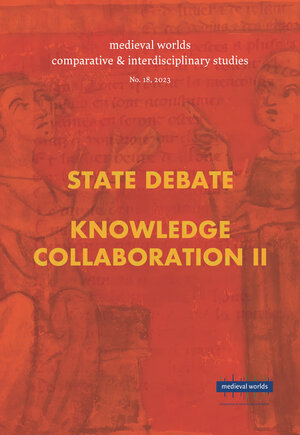
×
![Buchcover ISBN 9783700194446]()
medieval worlds ‒ comparative and interdisciplinary studies, No. 18/2023
State Debate and Knowledge Collaboration among Jews, Christians, Zoroastrians, and Muslims in the Abbasid Near East, II. Guest Editor: Nathan P. Gibson
herausgegeben von Walter Pohl, Andre Gingrich und Nathan P. Gibson“medieval worlds” provides a forum for comparative, interdisciplinary and transcultural studies of the Middle Ages. Its aim is to overcome disciplinary boundaries, regional limits and national research traditions in Medieval Studies, to open up new spaces for discussion, and to help developing global perspectives. We focus on the period from c. 400 to 1500 CE but do not stick to rigid periodization. medieval worlds is open to submissions of broadly comparative studies and matters of global interest, whether in single articles, companion papers, smaller clusters, or special issues on a subject of global/comparative history. We particularly invite studies of wide-ranging connectivity or comparison between different world regions. Apart from research articles, medieval worlds publishes ongoing debates and project and conference reports on comparative medieval research.
In this volume we introduce the debate as a new format in Medieval Worlds. Scholars are invited to contribute to current topics of interest either with an essay or with comments to this essay. The series is opened with a lively discussion of the concept of “state” in medieval studies and offers contributions by B. D. Shaw, N. Di Cosmo, S. Gasparri and C. La Rocca, H.-W. Goetz, J. Haldon, Y. Stouraitis and R. Le Jan. M. Wiesinger, C. Jackel and N. Orban discuss first results of their ground-breaking ERC project Arithmetic, in which German mathematical treatises from the Late Middle Ages are studied. The second stand-alone contribution by A. Wareham compares English and Chinese sources with regard to peacemaking around the turn of the 11th century. The second instalment of our thematic section on Knowledge Collaboration among Jews, Christians, Zoroastrians, and Muslims in the Abbasid Near East (guest editor N. P. Gibson) presents further studies on textual evidence of “other” (religions) as well as insights into possible uses of digital tools in this context.
In this volume we introduce the debate as a new format in Medieval Worlds. Scholars are invited to contribute to current topics of interest either with an essay or with comments to this essay. The series is opened with a lively discussion of the concept of “state” in medieval studies and offers contributions by B. D. Shaw, N. Di Cosmo, S. Gasparri and C. La Rocca, H.-W. Goetz, J. Haldon, Y. Stouraitis and R. Le Jan. M. Wiesinger, C. Jackel and N. Orban discuss first results of their ground-breaking ERC project Arithmetic, in which German mathematical treatises from the Late Middle Ages are studied. The second stand-alone contribution by A. Wareham compares English and Chinese sources with regard to peacemaking around the turn of the 11th century. The second instalment of our thematic section on Knowledge Collaboration among Jews, Christians, Zoroastrians, and Muslims in the Abbasid Near East (guest editor N. P. Gibson) presents further studies on textual evidence of “other” (religions) as well as insights into possible uses of digital tools in this context.


